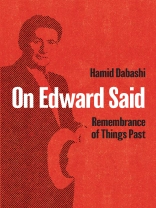Edward Said (1935-2003) was a towering figure in post-colonial studies and the struggle for justice in his native Palestine, best known for his critique of orientalism in western portrayals of the Middle East. As a public intellectual, activist, and scholar, Said forever changed how we read the world around us and left an indelible mark on subsequent generations.
Hamid Dabashi, himself a leading thinker and critical public voice, offers a unique collection of reminiscences, travelogues and essays that document his own close and long-standing scholarly, personal and political relationship with Said. In the process, they place the enduring significance of Edward Said’s legacy in an unfolding context and locate his work within the moral imagination and environment of the time.
قائمة المحتويات
Introduction
One: The Moment of Myth
Two: Mourning Edward Said
Three: Forget reds under the bed, there’s Arabs in the attic
Four: For a Fistful of Dust: A Passage to Palestine
Five: Dreams of a Nation
Six: On Exilic Intellectuals
Seven: Paradise Delayed: With Hany Abu‐Assad in Palestine
Eight: On Comprador Intellectuals
Nine: The Discrete Charm of European Intellectuals
Ten: The name that enables: remembering Edward Said
Eleven: Orientalism Today: A Conversation
Twelve: His Unconquerable Soul: Translating Said into another Key
Thirteen: Edward Said’s Orientalism: Forty years later
Fourteen: Rosa Luxemburg: The unsung hero of postcolonial theory
Fifteen: Palestine then and Now
Sixteen: Alas, poor Bernard Lewis, a fellow of infinite jest
عن المؤلف
Hamid Dabashi is the Hagop Kevorkian Professor of Iranian Studies and Comparative Literature at Columbia University. Among Dabashi’s recent books are On Edward Said: Remembrance of Things Past, The End of Two Illusions: Islam after the West, and Iran in Revolt: Revolutionary Aspirations in a Post-Democratic World.












